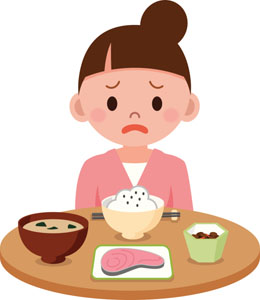Experiencing back pain and nausea after eating is not an uncommon occurrence, and there are many different causes for the emergence of this condition.

There are many digestive system disorders that can cause a variety of symptoms to erupt in a person, and if you are experiencing any back pain and nausea after eating, then you need to be concerned. Your concern should depend on the severity and the intensity of the discomfort that you feel. The human body is a complex mechanism, and there is no way to predict the appearance of pain at any point in time. When a person starts feeling pain in certain body parts, especially after meals or after carrying out any other task, then he/she should start analyzing the accompanying symptoms as well. This is the only way to diagnose the condition accurately, and this must be followed by the administering of a suitable form of treatment for the condition.
Possible Causes
There are many reasons why you could be experiencing this condition, because nausea and back pain are symptoms of many different disorders. The combination in which the symptoms occur and the time span between eating and the sensation of the pain, will help you determine the source of the discomfort. Most problems of this nature are going to be gastrointestinal (GI) conditions, since they are directly related to the act of eating. A disorder in the digestive tract can range from a mild infection, to a full flown disease that will severely limit your movement and your bodily functions.
Lower back pain and nausea are something that can also be attributed to lactose intolerance. This is a condition that arises because the individual is allergic to the lactose that is present in milk products, and this causes a variety of symptoms in the body. This is one of the most common symptoms, and all doctors around the world are well aware of this fact. Another possible culprit can be a material that is obstructing the intestinal passages. This results in a failure for particles to travel freely through the body, and this ultimately results in immense abdominal pain that spreads to the back, and nausea as well.
You could also be suffering due to the presence of kidney stones. This also blocks up vital passages in the body, and the pain in a kidney can easily be mistaken for a back problem. Irritable bowel syndrome is another possible culprit, and this is merely a temporary condition that arises due to the movement of the food in the digestive tract moving too fast or too slowly. If middle back pain occurs in spurts, it can be attributed to this condition. Some other conditions and disorders that leads to these symptoms are celiac disease,acid reflux (also known as gastroesophageal reflux), peptic ulcer, pancreatitis, and diverticulitis.
Precautions
Along with this sensation of pain and the feeling of nausea, some other symptoms will also occur as a result of these medical conditions. Some of these symptoms are as follows.
- Diarrhea
- Constipation
- Vomiting
- Flatulence
- Digestive tract bleeding
- Loss of appetite
- Globus sensation (feeling a lump in the throat)
In order to avoid these symptoms and these conditions, there are several precautions that one can take. It is important to avoid certain food items that you know cause adverse reactions in your body, and this is knowledge that will only be acquired by you over time and with experience. Following some simple tips may help you avoid the condition.
- Drink enough water on a daily basis.
- Exercise regularly for at least 30 minutes a day.
- Get enough sleep.
- Avoid junk food and excessively oily food.
- Eat items that improve digestion.
- Stay away from intoxicating substances.
- Consume some amount of ginger with your meals.
- Eat a banana everyday.
- Live a healthy lifestyle in general, and not a sedentary one.
This is something that you will have to live with if you do not follow these tips. If the condition is getting unbearable, visit a doctor for diagnosis and treatment options.
Disclaimer:
This Buzzle article is for informative purposes only, and should not be used as a replacement for expert medical advice.


 There are many digestive system disorders that can cause a variety of symptoms to erupt in a person, and if you are experiencing any back pain and nausea after eating, then you need to be concerned. Your concern should depend on the severity and the intensity of the discomfort that you feel. The human body is a complex mechanism, and there is no way to predict the appearance of pain at any point in time. When a person starts feeling pain in certain body parts, especially after meals or after carrying out any other task, then he/she should start analyzing the accompanying symptoms as well. This is the only way to diagnose the condition accurately, and this must be followed by the administering of a suitable form of treatment for the condition.
There are many digestive system disorders that can cause a variety of symptoms to erupt in a person, and if you are experiencing any back pain and nausea after eating, then you need to be concerned. Your concern should depend on the severity and the intensity of the discomfort that you feel. The human body is a complex mechanism, and there is no way to predict the appearance of pain at any point in time. When a person starts feeling pain in certain body parts, especially after meals or after carrying out any other task, then he/she should start analyzing the accompanying symptoms as well. This is the only way to diagnose the condition accurately, and this must be followed by the administering of a suitable form of treatment for the condition.